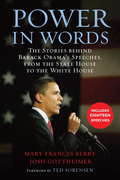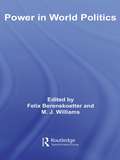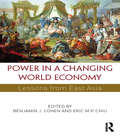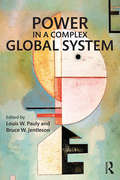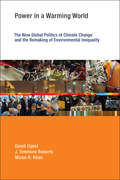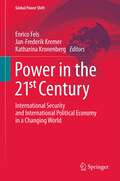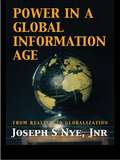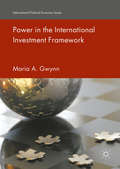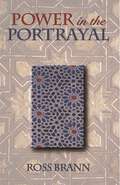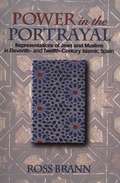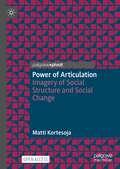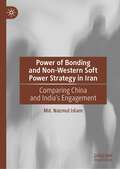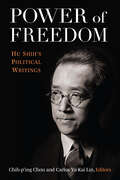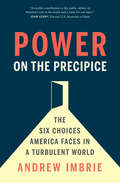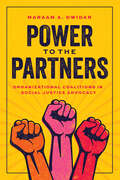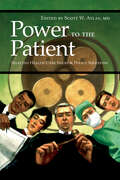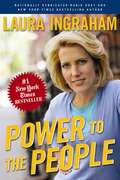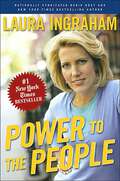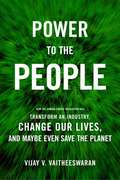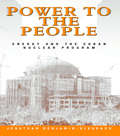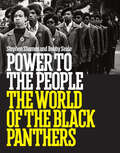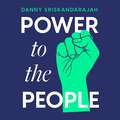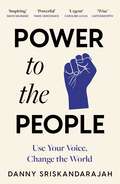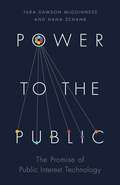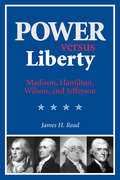- Table View
- List View
Power in Words
by Mary Frances Berry Josh Gottheimer Theodore C. SorensonWhatever his ratings, Obama remains personally popular, widely acknowledged for his soaring oratory. His words were one of the lasting legacies of his presidential campaign and are proving to be among his most effective governing weapons. In Power in Words, distinguished historian and civil rights activist Mary Frances Berry and former presidential speechwriter Josh Gottheimer introduce Obama's most memorable speeches, from his October 2002 speech against the war in Iraq and his November 2008 election-night victory speech to "A More Perfect Union," his March 2008 response to the Reverend Wright controversy, and lesser-known but revealing speeches, such as one given in Nairobi, Kenya, in August 2006. For each speech, Berry and Gottheimer add a rich introduction that includes political analysis, provides insight and historical context, and features commentary straight from the speechwriters themselves--including Jon Favreau, Obama's chief speechwriter, and several other Obama campaign writers. Compelling and enduring,Power in Words delivers the behind-the-scenes account of Obama's rhetorical legacy and is a collection to relish for years to come.
Power in World Politics
by Felix Berenskoetter M. J. WilliamsThis book engages the view that students of International Relations need to break with the habit of defining power in terms of military capabilities of states. Featuring contributions from both upcoming and distinguished scholars, including Steven Lukes, Joseph Nye, and Stefano Guzzini, it explores the nature and location of ‘power’ in international politics through a variety of conceptual lenses. With a particular focus on the phenomenon of ‘soft’ power and different types of actors in a globalizing world, fifteen chapters assess the meaning of ‘power’ from the perspectives of realism, constructivism, global governance, and development studies, presenting discussions ranging from conceptual to practical oriented analyses. Power in World Politics attempts to broaden theoretical horizons to enrich our understanding of the distribution of power in world politics, thereby also contributing to the discovery and analysis of new political spaces. This is essential reading for all advanced students and scholars of international relations.
Power in a Changing World Economy: Lessons from East Asia
by Benjamin J. Cohen Eric M. P. ChiuThis book is about power in a changing world economy. Though power is ubiquitous in the study of International Political Economy, the concept is underdeveloped in formal theoretical terms. This collection of essays analyses recent experience in East Asia to advance our theoretic understanding of state power in IPE. Over the last quarter century, no other region of the world has had a greater impact on the global distribution of economic resources and capabilities. China, with its "peaceful rise," now stands as the second largest national economy on the face of the earth; South Korea and Taiwan have become industrial powerhouses; Hong Kong and Singapore are among the world’s most important financial centres; and new poles of growth have emerged in several southeast Asian countries – all while Japan, long the region’s dominant market, has slipped into seemingly irreversible decline. The volume’s nine essays, contributed by leading scholars in the United States, Britain and Taiwan, aim to extract relevant inferences and insights from these developments for the study of state power. All are framed by a core agenda encompassing four key clusters of questions concerning the meaning, sources, uses, and limits of power. These essays ask: What new lessons are offered for power analysis in International Political Economy?
Power in a Complex Global System
by Louis W. Pauly Bruce W. JentlesonCan twenty-first century global challenges be met through the limited adaptation of existing political institutions and prevailing systemic norms, or is a more fundamental reconstitution of governing authority unavoidable? Are the stresses evident in domestic social compacts capable of undermining the fundamental policy capacity of contemporary governments? This book, inspired by the work of the distinguished scholar Peter J. Katzenstein, examines these important and pressing questions. In a period of complex political transition, the authors combine original research and intensive dialogue to build on Katzenstein’s innovative insights. They highlight his seminal work on variations in domestic structures, on the role of ideologies of social partnership, on the regionally differentiated foundations of political legitimation, on diverse conceptions of "civilization," and on the idea and practice of power in a tenuous American imperium. Together, the chapters map the complex terrain upon which legitimate political authority and effective policy capacity will have to be reconstituted to address twenty-first-century global, regional and state-level challenges. The book will be of great interest to students and scholars in international organization, global governance, foreign policy analysis, and comparative politics.
Power in a Warming World: The New Global Politics of Climate Change and the Remaking of Environmental Inequality (Earth System Governance)
by J. Timmons Roberts Mizan R. Khan David CipletAn examination of shifting global power dynamics in climate change politics, and how this affects our ability to achieve equitable and sustainable climate outcomes.After nearly a quarter century of international negotiations on climate change, we stand at a crossroads. A new set of agreements is likely to fail to prevent the global climate's destabilization. Islands and coastlines face inundation, and widespread drought, flooding, and famine are expected to worsen in the poorest and most vulnerable countries. How did we arrive at an entirely inequitable and scientifically inadequate international response to climate change? In Power in a Warming World, David Ciplet, J. Timmons Roberts, and Mizan Khan, bring decades of combined experience as negotiators, researchers, and activists to bear on this urgent question. Combining rich empirical description with a political economic view of power relations, they document the struggles of states and social groups most vulnerable to a changing climate and describe the emergence of new political coalitions that take climate politics beyond a simple North-South divide. They offer six future scenarios in which power relations continue to shift as the world warms. A focus on incremental market-based reform, they argue, has proven insufficient for challenging the enduring power of fossil fuel interests, and will continue to be inadequate without a bolder, more inclusive and aggressive response.
Power in the 21st Century: International Security and International Political Economy in a Changing World
by Jan-Frederik Kremer Enrico Fels Katharina KronenbergThe study of power is the nucleus of political science and international relations. As a shift of power from traditional industrial countries to emerging powers has been perceived since the turn of the century, this book aims to present innovative theoretical and empirical approaches that can increase our understanding of this transition. Scholars from the fields of international relations, international political economy, economics and security studies not only explore current theoretical debates on 'power' and 'power shifts' among entities, but also provide fresh insights into relevant aspects of international power in the 21st century. With a particular focus on aspects of international security, trade and production, new methods of identifying power and its sources are presented, and their potential implications and challenges are discussed.
Power in the Global Information Age: From Realism to Globalization
by Joseph S. Nye Jr.One of the most brilliant and influential international relations scholars of his generation, Joseph S. Nye Jr. is one of the few academics to have served at the very highest levels of US government. This volume collects together many of his key writings for the first time as well as new material, and an important concluding essay which examines the relevance of international relations in practical policymaking.This book addresses:* America's post-Cold War role in international affairs* the ethics of foreign policy* the information revolution* terrorism.
Power in the International Investment Framework
by Maria A. GwynnThis book offers a unique analysis of bilateral investment treaties (BITs). By developing a new, power-focused paradigm for understanding the international investment framework, the author illustrates why there was no paradoxical behaviour when developing countries agreed to the BIT regime, and what has spurred their reaction against it now. She also examines how attempts to regulate investment at a multilateral level have failed, and why the rules of the framework are evolving. Inspired by the work of Susan Strange, Gwynn fills a significant lacuna in our understanding of these issues by demonstrating how power determines the actions of all those involved. This holistic reinterpretation of international investment focuses in particular on Latin America, but has wider implications for the negotiation of new treaties, including such controversial provisions as the Transatlantic Trade and Investment Partnership. It will appeal to lawyers, economists, political scientists and scholars of Latin America.
Power in the Portrayal: Representations of Jews and Muslims in Eleventh- and Twelfth-Century Islamic Spain (Jews, Christians, and Muslims from the Ancient to the Modern World #39)
by Ross BrannPower in the Portrayal unveils a fresh and vital perspective on power relations in eleventh- and twelfth-century Muslim Spain as reflected in historical and literary texts of the period. Employing the methods of the new historical literary study in looking at a range of texts, Ross Brann reveals the paradoxical relations between the Andalusi Muslim and Jewish elites in an era when long periods of tolerance and respect were punctuated by outbreaks of tension and hostility. The examined Arabic texts reveal a fragmented perception of the Jew in eleventh-century al-Andalus. They depict seemingly contradictory figures at whose poles are an intelligent, skilled, and noble Jew deserving of homage and a vile, stupid, and fiendish enemy of God and Islam. For their part, the Hebrew and Judeo-Arabic texts display a deep-seated reluctance to portray Muslims in any light at all. Brann cogently demonstrates that these representations of Jews and Muslims--each of which is concerned with issues of sovereignty and the exercise of power--reflect the shifting, fluctuating, and ambivalent relations between elite members of two of the ethno-religious communities of al-Andalus. Brann's accessible prose is enriched by his splendid translations; the original texts are also included. This book is the first to study the construction of social meaning in Andalusi Arabic, Judeo-Arabic, and Hebrew literary texts and historical chronicles. The novel approach illuminates nuances of respect, disinterest, contempt, and hatred reflected in the relationship between Muslims and Jews in medieval Spain.
Power in the Portrayal: Representations of Jews and Muslims in Eleventh- and Twelfth-century Islamic Spain
by Ross BrannPower in the Portrayal unveils a fresh and vital perspective on power relations in eleventh- and twelfth-century Muslim Spain as reflected in historical and literary texts of the period. Employing the methods of the new historical literary study in looking at a range of texts, Ross Brann reveals the paradoxical relations between the Andalusi Muslim and Jewish elites in an era when long periods of tolerance and respect were punctuated by outbreaks of tension and hostility. The examined Arabic texts reveal a fragmented perception of the Jew in eleventh-century al-Andalus. They depict seemingly contradictory figures at whose poles are an intelligent, skilled, and noble Jew deserving of homage and a vile, stupid, and fiendish enemy of God and Islam. For their part, the Hebrew and Judeo-Arabic texts display a deep-seated reluctance to portray Muslims in any light at all. Brann cogently demonstrates that these representations of Jews and Muslims--each of which is concerned with issues of sovereignty and the exercise of power--reflect the shifting, fluctuating, and ambivalent relations between elite members of two of the ethno-religious communities of al-Andalus. Brann's accessible prose is enriched by his splendid translations; the original texts are also included. This book is the first to study the construction of social meaning in Andalusi Arabic, Judeo-Arabic, and Hebrew literary texts and historical chronicles. The novel approach illuminates nuances of respect, disinterest, contempt, and hatred reflected in the relationship between Muslims and Jews in medieval Spain.
Power of Articulation: Imagery of Social Structure and Social Change
by Matti KortesojaThis open access book is the first book that attempts to treat the notion of articulation as an important concept to be added to the lexicon of communication studies and social science. It constitutes the first comprehensive and systematic discussion of ‘articulation’ in English, providing an introduction of its usages and what has occurred on its ‘travels’ from one theoretical realm to another in political philosophy, structural linguistics, new economic anthropology, cultural studies and post-Marxist discourse theory. The proposed research takes a relational approach to society and social action in a way that recognises their relative autonomy. It entails an introduction of the ‘discursive turn’ in the imagery of society and social change, thereby proving that the relational concept of articulation/Gliederung has potential to consider society as both a structured, complex whole and a product of human interaction.
Power of Bonding and Non-Western Soft Power Strategy in Iran: Comparing China and India's Engagement
by Md. Nazmul IslamThis book comparatively assesses the China and India’s soft power strategy in Iran. By employing Joseph S. Nye’s “Soft Power” theory and forming the new concept of “Power of Bonding”, this book formulated China and India’s soft power narratives and applied it through the empirical analysis in Iran. Based on this theory, this book seeks explanations for the question of “How China and India respectively, strategically and comparatively use the soft power strategy in Iran?”. To reach the find-out, this book compares the understanding, resources, strategies, influences and uses of China and India’s soft power in Iran under three thematic areas, including “power of bonding through cultural attractions, and attributions”; “political and diplomatic engagement” and “economic partnerships”. By analysing China and India’s soft power strategy in Iran, this book seeks to contribute to the soft power literature through a theoretical replication based on non-Western soft power strategy, the concept and its empirical application in China and India.
Power of Freedom: Hu Shih's Political Writings (China Understandings Today)
by Chih-P'Ing Chou Carlos LinDr. Hu Shih (1891–1962) was one of China’s top scholars and diplomats and served as the Republic of China’s ambassador to the United States during World War II. As early as 1941, Hu Shih warned of the fundamental ideological conflict between dictatorial totalitarianism and democratic systems, a view that later became the foundation of the Cold War narrative. In the 1950s, after Mao’s authoritarian regime was established, Hu Shih started to analyze the development and nature of Communism, delivering a series of lectures and addresses to reveal what he called Stalin’s “grand strategy” for facilitating the International Communist Movement. For decades—and today to a certain extent—Hu Shih’s political writings were considered sensitive and even dangerous. As a strident critic of the Chinese Communist Party’s oligarchical practices, he was targeted by the CCP in a concerted national campaign to smear his reputation, cast aspersions on his writings, and generally destroy any possible influence he might have in China. This volume brings together a collection of Hu Shih’s most important, mostly unpublished, English-language speeches, interviews, and commentaries on international politics, China-U.S. relations, and the International Communist Movement. Taken together, these works provide an insider’s perspective on Sino-American relations and the development of the International Communist Movement over the course of the 20th century.
Power on the Precipice: The Six Choices America Faces in a Turbulent World
by Andrew ImbrieAn essential guide to renewing American leadership in a turbulent, polarized, and postdominant world Is America fated to decline as a great power? Can it recover? With absorbing insight and fresh perspective, foreign policy expert Andrew Imbrie provides a road map for bolstering American leadership in an era of turbulence abroad and deepening polarization at home. This is a book about choices: the tough policy trade-offs that political leaders need to make to reinvigorate American money, might, and clout. In the conventional telling, the United States is either destined for continued dominance or doomed to irreversible decline. Imbrie argues instead that the United States must adapt to changing global dynamics and compete more wisely. Drawing on the author’s own experience as an adviser to Secretary of State John Kerry, as well as on interviews and comparative studies of the rise and fall of nations, this book offers a sharp look at American statecraft and the United States’ place in the world today.
Power to the Partners: Organizational Coalitions in Social Justice Advocacy
by Maraam A. DwidarA vital examination of how social and economic justice organizations overcome resource disadvantages and build political power. Why do some coalitions triumph while others fall short? In Power to the Partners, Maraam A. Dwidar documents the vital role of social and economic justice organizations in American politics and explores the process by which they strategically build partnerships to advance more effective and equitable advocacy. Using original data tracking the collaboration patterns of more than twenty thousand nationally active advocacy organizations, Dwidar evaluates the micro- and macro-level conditions surrounding these groups’ successful efforts to collectively shape public policy. Power to the Partners reveals that while organizational advocates for social and economic justice are at a disadvantage in the American lobbying landscape—financially, tactically, and politically—coalition work can help ameliorate these disparities. By building and sustaining coalitions with structures and memberships that facilitate clarity, learning, and diverse perspectives, these advocates can successfully—and uniquely—make their mark on American public policy. Dwidar’s work offers critical insights for scholars and practitioners alike, from groundbreaking academic findings to evidence-based lessons for political organizers.
Power to the Patient: Selected Health Care Issues and Policy Solutions
by Scott W. AtlasThe debate rages on over how to cope with the rising costs of medical care—proposed solutions range from a single payer system with a broad government control to loosely defined market-driven plans. The authors look at three key elements of health care costs and offer thoughtful, realistic suggestions to help stem the tide of rising expenses for everyone.
Power to the People
by Laura IngrahamThis popular talkshow host sets forth in a lively style the problems she sees besetting America and her solutions for them. She addresses Attack on the family, runaway government, uncontrolled judiciary, failing schools, politicization of science, and terrorism.
Power to the People
by Laura IngrahamIn her latest, radio personality and author Ingraham (Shut up and Sing) calls on the American people to take back the phrase "Power to the People" from the anti-establishment groups of yesterday that, today, have made the country, according to Ingraham, "a slave to fringe groups, political correctness, expanding bureaucracies, and our own consumerism." Taking an approach that makes mutually exclusive groups out of those "working and taking care of their families" and the "protest culture," Ingraham's message is loud and clear: "they're coming for you." Specifically, "they" means the Lifetime network (brainwashing women to "swear off men and family"), the growing ranks of "Team Atheist" (including Dan Brown), "family deconstructivists," illegal immigrants and Islamic jihadists, among others. Chapters cover most of today's hot button topics-the war in Iraq, homeland security, the judiciary, the news media and global warming-with attitude and conviction. Ingraham's commentary on the lack of education in our schools and the "pornification" of the culture contain her most sound, articulate arguments (bolstered by a wealth of statistics), but Ingraham's assembling tactics are overzealous; still, fans of her strident radio show should be pleased to find more of the same here.
Power to the People
by Vijay V. VaitheeswaranA guided tour of a revolution in the making that promises to change our livesGlobal warming, rolling black outs, massive tanker spills, oil dependence: our profligate ways have doomed us to suffer such tragedies, right? Perhaps, but Vijay Vaitheeswaran, the energy and environment correspondent for The Economist, sees great opportunity in the energy realm today, and Power to the People is his fiercely independent and irresistibly entertaining look at the economic, political, and technological forces that are reshaping the world's management of energy resources. In it, he documents an energy revolution already underway--a revolution as radical as the communications revolution of the past decades.
Power to the People: Energy and the Cuban Nuclear Program
by Jonathan Benjamin-AlvaradoFirst published in 2000. Routledge is an imprint of Taylor & Francis, an informa company.
Power to the People: The World of the Black Panthers
by Stephen Shames Seale BobbyThis pictorial history tells the story of the revolutionary Black Panther Party in the words of its co-founder, Bobby Seale. Coming toward the end of America’s epic Civil Rights Movement, the Black Panther Party was one of the most creative and influential responses to racism and inequality in American history. They advocated armed self-defense to counter police brutality, and initiated a program of patrolling the police with shotguns—and law books. In words and photographs, Power to the People explores the impact and achievements of this revolutionary organization. The words are Seale’s, with contributions by other former party members. The photographs are by Stephen Shames, the Panther’s most trusted documentarian. Power to the People is a testament to their warm association, combining Shames’s memorable images with Seale’s colorful in-depth commentary culled from many hours of conversation.Shames also interviewed major party figures for this volume, including Kathleen Cleaver, Elbert “Big Man” Howard, Ericka Huggins, Emory Douglas, and William “Billy X” Jennings. His photography is supplemented with Panther ephemera and graphic art.
Power to the People: Use your voice, change the world
by Danny SriskandarajahDanny Sriskandarajah learned the value of citizenship at a young age as the child of Tamil migrants who moved from Sri Lanka to Australia. Arriving in the UK as the first Rhodes scholar from an Asian immigrant background, he has gone on to run a series of civil society organisations, and has become a leading voice in the third sector.POWER TO THE PEOPLE is his radical manifesto for change designed to inspire citizen action around the world. The book presents a blueprint for how we, as individuals, can make a difference through greater community engagement, and how we can deliver a society that works for the many and not the few. He speaks to voter apathy and a growing sense that elections no longer matter, with politicians and institutions too focused on short-term issues to grapple with complex global problems such as climate change, rising inequality, and digital disruption. Yet the book is also filled with inspiring real-life examples of citizen power in action, ranging from a volunteer-run repair café in Danny's local suburb to Avaaz's successful campaigns to tackle endemic corruption in Brazil.From public ownership of social media spaces to democratising share ownership, and from re-energising co-operatives to creating a people's chamber at the United Nations, this campaigning book has a clear mission to make us reclaim our power as citizens of the world.
Power to the People: Use your voice, change the world
by Danny SriskandarajahDanny Sriskandarajah learned the value of citizenship at a young age as the child of Tamil migrants who moved from Sri Lanka to Australia. Arriving in the UK as the first Rhodes scholar from an Asian immigrant background, he has gone on to run a series of civil society organisations, and has become a leading voice in the third sector.POWER TO THE PEOPLE is his radical manifesto for change designed to inspire citizen action around the world. The book presents a blueprint for how we, as individuals, can make a difference through greater community engagement, and how we can deliver a society that works for the many and not the few. He speaks to voter apathy and a growing sense that elections no longer matter, with politicians and institutions too focused on short-term issues to grapple with complex global problems such as climate change, rising inequality, and digital disruption. Yet the book is also filled with inspiring real-life examples of citizen power in action, ranging from a volunteer-run repair café in Danny's local suburb to Avaaz's successful campaigns to tackle endemic corruption in Brazil.From public ownership of social media spaces to democratising share ownership, and from re-energising co-operatives to creating a people's chamber at the United Nations, this campaigning book has a clear mission to make us reclaim our power as citizens of the world.
Power to the Public: The Promise of Public Interest Technology
by Hana Schank Tara Dawson McGuinnessA powerful new blueprint for how governments and nonprofits can harness the power of digital technology to help solve the most serious problems of the twenty-first centuryAs the speed and complexity of the world increases, governments and nonprofit organizations need new ways to effectively tackle the critical challenges of our time—from pandemics and global warming to social media warfare. In Power to the Public, Tara Dawson McGuinness and Hana Schank describe a revolutionary new approach—public interest technology—that has the potential to transform the way governments and nonprofits around the world solve problems. Through inspiring stories about successful projects ranging from a texting service for teenagers in crisis to a streamlined foster care system, the authors show how public interest technology can make the delivery of services to the public more effective and efficient.At its heart, public interest technology means putting users at the center of the policymaking process, using data and metrics in a smart way, and running small experiments and pilot programs before scaling up. And while this approach may well involve the innovative use of digital technology, technology alone is no panacea—and some of the best solutions may even be decidedly low-tech.Clear-eyed yet profoundly optimistic, Power to the Public presents a powerful blueprint for how government and nonprofits can help solve society’s most serious problems.
Power versus Liberty: Madison, Hamilton, Wilson, and Jefferson
by James H. ReadDoes every increase in the power of government entail a loss of liberty for the people? James H. Read examines how four key Founders--James Madison, Alexander Hamilton, James Wilson, and Thomas Jefferson--wrestled with this question during the first two decades of the American Republic.Power versus Liberty reconstructs a four-way conversation--sometimes respectful, sometimes shrill--that touched on the most important issues facing the new nation: the Constitution, the Bill of Rights, federal authority versus states' rights, freedom of the press, the controversial Bank of the United States, the relation between nationalism and democracy, and the elusive meaning of "the consent of the governed."Each of the men whose thought Read considers differed on these key questions. Jefferson believed that every increase in the power of government came at the expense of liberty: energetic governments, he insisted, are always oppressive. Madison believed that this view was too simple, that liberty can be threatened either by too much or too little governmental power. Hamilton and Wilson likewise rejected the Jeffersonian view of power and liberty but disagreed with Madison and with each other.The question of how to reconcile energetic government with the liberty of citizens is as timely today as it was in the first decades of the Republic. It pervades our political discourse and colors our readings of events from the confrontation at Waco to the Oklahoma City bombing to Congressional debate over how to spend the government surplus. While the rhetoric of both major political parties seems to posit a direct relationship between the size of our government and the scope of our political freedoms, the debates of Madison, Hamilton, Wilson, and Jefferson confound such simple dichotomies. As Read concludes, the relation between power and liberty is inherently complex.
